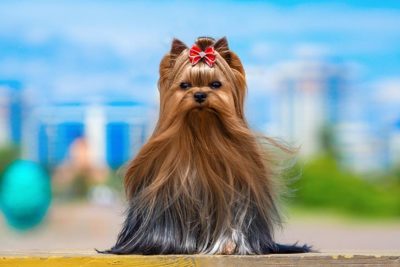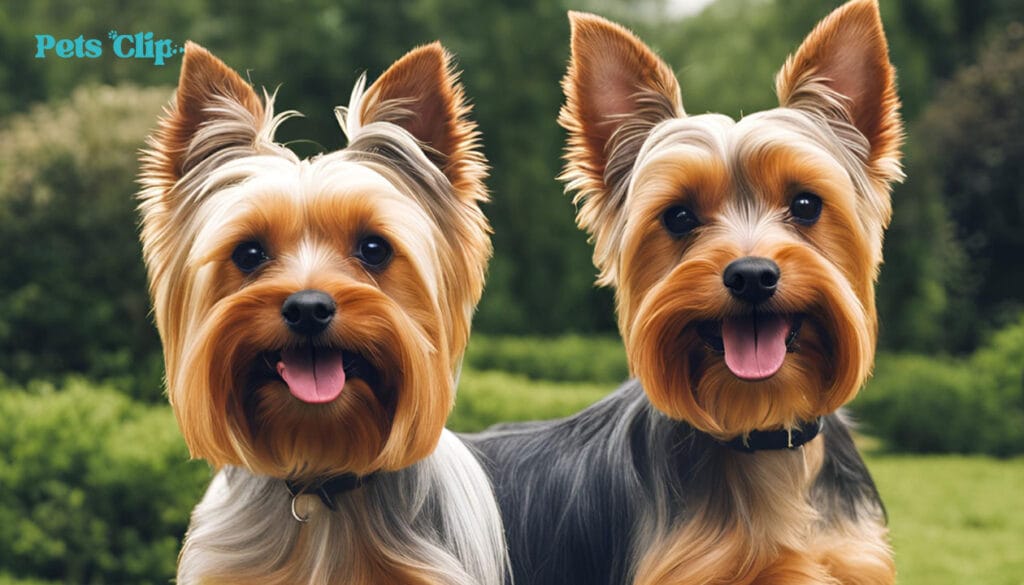Yorkies are considered hypoallergenic dog breeds. They shed less dander, making them suitable for allergy sufferers.
Yorkshire Terriers, commonly known as Yorkies, are small, energetic dogs with a silky coat. Their hypoallergenic nature makes them a popular choice for families with allergies. These dogs have hair similar to human hair, which reduces the amount of allergens they release.
Yorkies are known for their affectionate and loyal temperament, making them great companions. Their small size and minimal shedding also make them ideal for apartment living. Regular grooming is essential to keep their coat healthy and reduce allergen buildup. With proper care, Yorkies can be a delightful addition to any home.

Credit: www.purelypetsinsurance.co.uk
Yorkies And Allergies
Yorkshire Terriers, or Yorkies, are a popular dog breed known for their small size and vibrant personalities. But are Yorkies hypoallergenic? Many people with allergies are curious about how Yorkies might affect them. Understanding the relationship between Yorkies and allergies can help prospective pet owners make informed decisions.
Allergic Reactions
People can have allergic reactions to dogs due to proteins found in the dog’s skin cells, urine, and saliva. These proteins can cause symptoms in sensitive individuals. Yorkies, like all dogs, produce these proteins, but they shed less dander compared to other breeds. This reduced shedding can make them a better option for some allergy sufferers.
Some common triggers for allergic reactions to Yorkies include:
- Dander: Tiny flakes of skin that can cause irritation
- Saliva: When a Yorkie licks you, the proteins in their saliva can cause a reaction
- Urine: Contact with urine can lead to symptoms
To minimize allergic reactions, consider the following tips:
- Regular grooming: Bathing and brushing your Yorkie can reduce dander
- Cleaning: Vacuuming and cleaning surfaces can help remove dander
- Air purifiers: Using an air purifier with a HEPA filter can capture allergens
Common Symptoms
Allergic reactions to Yorkies can manifest in various ways. Recognizing these symptoms is crucial for managing your allergies effectively. Common symptoms include:
- Sneezing: Frequent sneezing can occur due to airborne dander
- Runny or stuffy nose: Allergens can irritate nasal passages
- Itchy or watery eyes: Eye irritation is a common sign of allergies
- Skin rashes: Direct contact with saliva or dander can cause rashes
- Coughing: Inhaling allergens can lead to coughing
For a clearer understanding, here’s a table summarizing the common symptoms:
| Symptom | Description |
|---|---|
| Sneezing | Frequent sneezes due to airborne allergens |
| Runny or stuffy nose | Nasal irritation from allergens |
| Itchy or watery eyes | Eye irritation caused by dander |
| Skin rashes | Rashes from direct contact with allergens |
| Coughing | Allergens inhaled causing a cough |
Identifying these symptoms early can help you take steps to manage your allergies. Consulting a healthcare provider for personalized advice is always a good idea.
Hypoallergenic Traits
Yorkshire Terriers, or Yorkies, are often considered hypoallergenic dog breeds. Their unique traits can make them a better fit for people with allergies. Understanding these hypoallergenic traits helps in making an informed decision about adopting a Yorkie.
Coat Characteristics
Yorkies have a distinctive coat that sets them apart from many other dog breeds. Their hair is more similar to human hair than typical dog fur.
Here are some key coat characteristics of Yorkies:
- Silky Texture: Yorkie hair is fine and silky, reducing the amount of allergens.
- Single Layer: They have a single-layered coat, unlike double-coated breeds that shed more.
- Minimal Shedding: Yorkies shed very little, which means fewer allergens in the home.
The single-layered, silky coat of Yorkies means they shed less. This characteristic is beneficial for those with allergies.
Here is a comparison table:
| Feature | Yorkies | Other Breeds |
|---|---|---|
| Coat Type | Single-layered, silky | Double-layered, coarse |
| Shedding | Minimal | Moderate to high |
| Allergen Level | Low | High |
Dander Production
Dander is a common allergen produced by all animals with fur or feathers. Yorkies produce less dander than many other dog breeds.
Here are some factors that contribute to lower dander production in Yorkies:
- Hair Structure: The structure of Yorkie hair traps less dander.
- Regular Grooming: Regular grooming reduces dander buildup.
- Skin Health: Healthy skin produces less dander.
These factors make Yorkies a good choice for allergy sufferers. Regular grooming is essential for maintaining low dander levels.
Here is a simple regimen to follow:
- Brush your Yorkie daily to remove loose hair and dander.
- Bathe your Yorkie every 3-4 weeks to keep the skin healthy.
- Use hypoallergenic shampoos to reduce skin irritation.
By following these steps, you can minimize dander and enjoy a hypoallergenic environment with your Yorkie.
Grooming Needs
Yorkies, or Yorkshire Terriers, are often considered hypoallergenic dog breeds. This means they may cause fewer allergic reactions in people. Yorkies have unique grooming needs. Their hair is more like human hair and requires regular attention to stay healthy and beautiful.
Regular Maintenance
Regular maintenance of your Yorkie’s coat is crucial. Their hair can grow long and silky, but it needs care to avoid tangles and mats. Here are some key points to remember:
- Bathing: Bathe your Yorkie every 2-3 weeks. Use a mild dog shampoo to keep their skin and coat healthy.
- Trimming: Regular trims prevent their hair from becoming too long and unmanageable. Trim the hair around their eyes, ears, and paws.
- Nail Clipping: Keep their nails short. Long nails can cause discomfort and even lead to health issues.
Yorkies also need attention to their ears and teeth. Clean their ears weekly to prevent infections. Brush their teeth daily to avoid dental problems. Here’s a simple table outlining a weekly grooming schedule:
| Day | Grooming Task |
|---|---|
| Monday | Brush coat, clean ears |
| Wednesday | Brush coat, trim nails |
| Friday | Brush coat, check eyes |
| Sunday | Brush coat, bathe |
Brushing Techniques
Brushing your Yorkie is vital to prevent tangles and mats. Yorkies have fine hair that can easily become knotted. Follow these brushing techniques for the best results:
- Use the right brush: A slicker brush works well for Yorkies. It helps remove loose hair and detangle.
- Section the hair: Divide the coat into small sections. Brush one section at a time to avoid missing any knots.
- Gentle strokes: Use gentle, short strokes. Start from the roots and work towards the tips.
- Check for mats: If you find a mat, use a detangling spray. Gently work through the mat with your fingers before brushing it out.
- Brush daily: Regular brushing keeps the coat healthy and prevents major tangles.
Always be patient and calm while brushing. Yorkies can sense stress and may become anxious. Make brushing a positive experience with treats and praise. This way, your Yorkie will enjoy grooming time, and their coat will remain beautiful and healthy.
Living With Yorkies
Yorkies, or Yorkshire Terriers, are often considered hypoallergenic. This means they are less likely to cause allergic reactions in people. Living with Yorkies can be enjoyable and comfortable, especially if you manage your indoor environment and air quality properly. Here are some tips and insights on how to live happily with your furry friend.
Indoor Environment
Creating a comfortable indoor environment for your Yorkie is crucial. These small dogs thrive in clean, well-organized spaces. Here are some tips to make your home more Yorkie-friendly:
- Regular Cleaning: Keep your floors and furniture clean to reduce allergens. Vacuum frequently using a vacuum with a HEPA filter.
- Pet-Friendly Furniture: Choose furniture that is easy to clean. Leather or tightly woven fabrics are good options.
- Designated Pet Areas: Create specific areas for your Yorkie to play and sleep. Use washable blankets and beds to keep these areas clean.
Yorkies love to play, so make sure there are plenty of toys available. Rotate the toys to keep your pet engaged and interested. Also, ensure that your Yorkie has access to fresh water at all times.
Temperature control is important for Yorkies. They are sensitive to extreme temperatures. Keep your home at a comfortable temperature year-round. If it’s too hot or cold, your Yorkie may feel uncomfortable.
Air Quality Tips
Maintaining good air quality is essential for both you and your Yorkie. Here are some tips to ensure the air in your home is clean and fresh:
- Use Air Purifiers: Invest in a good quality air purifier with a HEPA filter. This helps remove pet dander, dust, and other allergens from the air.
- Ventilation: Ensure your home is well-ventilated. Open windows regularly to let fresh air in, but make sure your Yorkie can’t escape.
- Avoid Smoking Indoors: Smoking can significantly reduce air quality. Always smoke outside to keep the indoor air clean.
Houseplants can also improve air quality. Plants like spider plants, snake plants, and peace lilies are excellent choices. They help filter the air and add a touch of nature to your home.
Regular grooming of your Yorkie also helps maintain air quality. Brush your Yorkie daily to reduce shedding and dander. Bathing your pet regularly will also help keep allergens to a minimum.
By following these tips, you can ensure a clean, comfortable, and healthy living environment for both you and your Yorkie.

Other Hypoallergenic Breeds
Yorkies are often celebrated for their hypoallergenic qualities, making them a popular choice for allergy sufferers. But they are not the only hypoallergenic dog breed. Several other breeds also boast this desirable trait, providing a range of options for potential pet owners who need a low-allergen companion.
Similar Sized Dogs
Yorkies are small, hypoallergenic dogs, but there are other breeds of a similar size that also have hypoallergenic qualities. Here are a few:
- Maltese: These tiny dogs have long, silky hair that rarely sheds.
- Poodle (Toy and Miniature): Known for their curly, non-shedding coats, Poodles come in various sizes, including toy and miniature.
- Bichon Frise: These small dogs have a fluffy, curly coat that produces less dander.
- Shih Tzu: With their long, flowing hair, Shih Tzus are another small breed less likely to cause allergies.
The table below summarizes these breeds:
| Breed | Size | Coat Type |
|---|---|---|
| Maltese | Small | Long, silky hair |
| Poodle (Toy & Miniature) | Small | Curly, non-shedding |
| Bichon Frise | Small | Fluffy, curly coat |
| Shih Tzu | Small | Long, flowing hair |
Comparison Of Traits
When comparing hypoallergenic breeds, several traits are worth considering. These include coat type, maintenance needs, and temperament.
Coat Type: The type of coat can significantly impact the amount of allergens a dog produces. For instance, Poodles have a curly, non-shedding coat, which traps dander. In contrast, Maltese have long, silky hair that doesn’t shed much but requires regular grooming.
Maintenance Needs: Different breeds have varying grooming requirements. Bichon Frises need regular brushing and occasional trimming to keep their fluffy coats in check. Shih Tzus also require frequent grooming due to their long hair.
Temperament: Temperament can vary widely among these breeds. Poodles are known for their intelligence and trainability. Maltese dogs are affectionate and playful. Bichon Frises are friendly and good with children, while Shih Tzus are known for their loyal and gentle nature.
The table below highlights these traits:
| Breed | Coat Type | Maintenance | Temperament |
|---|---|---|---|
| Maltese | Long, silky hair | High | Affectionate, playful |
| Poodle (Toy & Miniature) | Curly, non-shedding | Moderate | Intelligent, trainable |
| Bichon Frise | Fluffy, curly coat | Moderate | Friendly, good with children |
| Shih Tzu | Long, flowing hair | High | Loyal, gentle |
Understanding these traits can help you choose the right hypoallergenic dog that fits your lifestyle and preferences.

Credit: www.akc.org
Choosing A Yorkie
Yorkshire Terriers, or Yorkies, are beloved for their small size and charming personalities. Many potential pet owners wonder if Yorkies are hypoallergenic. These little dogs produce fewer allergens than some breeds, making them a popular choice for allergy sufferers. If you are thinking about bringing a Yorkie into your home, knowing how to choose the right one is essential. The following sections will guide you through important considerations.
Breeder Considerations
Choosing a Yorkie from a reputable breeder is crucial. A good breeder ensures the health and quality of the breed. Here are some key points to consider:
- Health Screenings: Reputable breeders conduct health screenings for genetic issues.
- Breeder Reputation: Check reviews and ask for references.
- Visit the Breeding Facility: Make sure the dogs are kept in clean, humane conditions.
- Meet the Parents: Meeting the puppy’s parents can give you an idea of their future temperament and size.
These considerations ensure you are getting a healthy, well-adjusted puppy. Many breeders also provide initial vaccinations and health records. Here’s a quick comparison table of what to look for:
| Aspect | Reputable Breeder | Puppy Mill |
|---|---|---|
| Health Screenings | Comprehensive | Minimal or None |
| Living Conditions | Clean and Humane | Often Poor |
| Parental Interaction | Encouraged | Discouraged |
| Initial Vaccinations | Provided | Not Guaranteed |
Adoption Options
Adopting a Yorkie is another wonderful option. Many Yorkies end up in shelters or rescue groups. Here are some reasons to consider adoption:
- Saving a Life: You provide a loving home to a dog in need.
- Lower Cost: Adoption fees are typically lower than breeder prices.
- Adult Dogs Available: Many shelters have adult Yorkies, which may be already trained.
To adopt a Yorkie, start by visiting local shelters or checking online rescue groups. Many organizations have websites with photos and descriptions of available dogs. Here’s a list of steps to follow:
- Visit local animal shelters.
- Check online rescue groups.
- Meet potential pets and ask about their history.
- Ensure the dog fits your lifestyle and home environment.
Adoption provides a second chance for dogs who need it most. Whether you choose to buy from a breeder or adopt, you are sure to enjoy the companionship of a loving Yorkie.
Health Considerations
Yorkies, also known as Yorkshire Terriers, are a small and charming breed loved by many. One of the main questions potential owners ask is whether Yorkies are hypoallergenic. While they produce fewer allergens than some breeds, it’s important to consider their overall health. Understanding health considerations can help ensure your Yorkie leads a happy and healthy life.
Common Ailments
Despite their small size, Yorkies can face several health challenges. Some common ailments include:
- Dental Issues: Yorkies often suffer from tooth decay and gum disease. Regular dental care is crucial.
- Luxating Patella: This condition affects their knees, causing discomfort and mobility issues.
- Hypoglycemia: Low blood sugar can be dangerous for Yorkies, leading to weakness and seizures.
- Tracheal Collapse: Their small tracheas can collapse, causing breathing difficulties.
Here’s a table summarizing these common ailments:
| Ailment | Symptoms | Prevention |
|---|---|---|
| Dental Issues | Bad breath, tooth loss | Regular brushing, dental check-ups |
| Luxating Patella | Limping, skipping steps | Controlled exercise, surgery if needed |
| Hypoglycemia | Weakness, seizures | Frequent meals, vet monitoring |
| Tracheal Collapse | Honking cough, difficulty breathing | Avoiding neck pressure, vet care |
Preventive Care
Preventive care is key to keeping your Yorkie healthy. Here are some steps you can take:
- Regular Vet Check-ups: Schedule annual or bi-annual visits to catch any health issues early.
- Balanced Diet: Feed your Yorkie high-quality dog food to ensure they get essential nutrients.
- Dental Hygiene: Brush their teeth regularly and provide dental treats to prevent tooth decay.
- Controlled Exercise: Keep them active with daily walks and playtime, but avoid overexertion.
- Vaccinations: Keep vaccinations up to date to protect against common diseases.
Here’s a quick checklist for preventive care:
- Annual vet check-ups
- High-quality diet
- Daily teeth brushing
- Regular exercise
- Up-to-date vaccinations
Following these guidelines can help your Yorkie live a longer, healthier life. Always consult with your vet for personalized advice.

Credit: www.petmd.com
Owner Testimonials
Yorkshire Terriers, or Yorkies, are often labeled as hypoallergenic dogs. Many potential dog owners with allergies are curious about the experiences of those who already have Yorkies. Owner testimonials provide valuable insights into living with these charming and tiny dogs. Let’s explore what current Yorkie owners have to say.
Positive Experiences
Many Yorkie owners share glowing reviews about their furry friends. They appreciate the reduced allergic reactions they experience compared to other dog breeds. Here are some of the positive experiences shared by Yorkie owners:
- Minimal Shedding: One of the biggest advantages is that Yorkies shed very little. This significantly reduces the amount of dander in the home.
- Compact Size: Their small size makes them perfect for apartment living. They fit comfortably in smaller spaces.
- Affectionate Nature: Owners love their Yorkies’ affectionate and loyal nature. They form strong bonds with their human families.
- Low Maintenance: Despite their long hair, Yorkies are relatively easy to groom. Regular brushing keeps their coat in good condition.
Many Yorkie owners report that their allergy symptoms decreased after adopting a Yorkie. This breed’s hypoallergenic qualities seem to be a significant factor in this improvement.
| Positive Aspects | Owner Comments |
|---|---|
| Minimal Shedding | “I hardly ever find hair around the house.” |
| Compact Size | “Perfect for my small apartment.” |
| Affectionate Nature | “My Yorkie is always by my side.” |
| Low Maintenance | “A quick brush keeps her looking great.” |
Challenges Faced
While there are many positives, owning a Yorkie also comes with challenges. Some owners face issues that are unique to this breed. Here are some of the common challenges:
- Grooming Needs: Despite being low maintenance, Yorkies require regular grooming. Their long hair can get tangled and matted if not brushed frequently.
- Health Issues: Yorkies are prone to certain health problems such as dental issues and tracheal collapse. Regular vet visits are essential.
- Separation Anxiety: Yorkies can become very attached to their owners. They may experience anxiety when left alone for long periods.
- Stubbornness: Training a Yorkie can be challenging due to their stubborn nature. Consistency and patience are key.
Some owners mention the high grooming costs associated with professional grooming services. Yorkies’ long hair requires frequent trips to the groomer, which can add up over time. Others note that managing their Yorkie’s health issues can be stressful and costly.
Despite these challenges, many Yorkie owners feel that the positives far outweigh the negatives. They appreciate the unique qualities and companionship that Yorkies bring into their lives.
| Challenges | Owner Comments |
|---|---|
| Grooming Needs | “Regular brushing is a must.” |
| Health Issues | “Frequent vet visits are needed.” |
| Separation Anxiety | “My Yorkie gets anxious when alone.” |
| Stubbornness | “Training took a lot of patience.” |
Frequently Asked Questions
Are Yorkies Hypoallergenic?
Yes, Yorkies are considered hypoallergenic because they shed very little. Their hair is more like human hair, reducing allergens.
Do Yorkies Cause Allergies?
Yorkies can still cause allergies, but their low shedding reduces this risk. Regular grooming can further minimize allergens.
How To Reduce Yorkie Allergens?
Regular grooming, bathing, and vacuuming can help reduce Yorkie allergens. Use air purifiers to keep the environment allergen-free.
Are Yorkies Good For Allergy Sufferers?
Yorkies are a better option for allergy sufferers due to their low shedding. However, individual reactions may vary.
Conclusion
Yorkies can be a good choice for allergy sufferers. Their low-shedding coats produce fewer allergens. Always spend time with a Yorkie before deciding. Each person’s reaction can vary. Consult with a veterinarian to ensure the best fit for your family.
With proper care, Yorkies can be loving, hypoallergenic pets.
